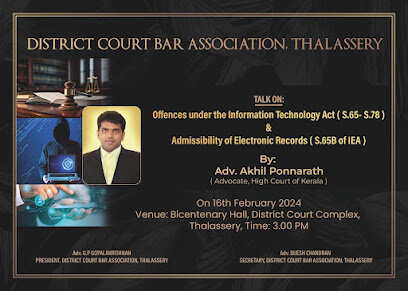Best Father's Rights Lawyers in Kannur
Share your needs with us, get contacted by law firms.
Free. Takes 2 min.
Free Guide to Hiring a Family Lawyer
List of the best lawyers in Kannur, India
About Father's Rights Law in Kannur, India
Father's rights refer to the legal entitlements and responsibilities that fathers have regarding their children, especially concerning custody, visitation, maintenance, and upbringing after a separation or divorce. In Kannur, India, these rights are governed by national laws such as the Hindu Marriage Act, the Guardians and Wards Act, and the Indian Divorce Act, among others, but are influenced by local courts' practices and cultural perspectives. Though the law recognizes both parents' rights, historically, mothers are often granted primary custody, but fathers maintain significant legal rights that can be upheld with proper legal support.
Why You May Need a Lawyer
Families in Kannur may face various situations where clear legal guidance is necessary to protect a father's rights. Common scenarios include disputes over child custody or visitation, disagreements about child support, false allegations that may hinder access to children, or complexities arising from interfaith or inter-caste marriages. An experienced family lawyer can help advocate for your parental rights, guide you through court procedures, and ensure you are treated fairly under the law.
Local Laws Overview
Kannur follows the Indian legal framework for family law, yet local courts interpret and apply these statutes in context. Key aspects of the law affecting father's rights include:
- The child's welfare is the primary consideration in all custody and guardianship matters.
- Under Hindu law, both mother and father can be natural guardians. On the father's death, guardianship generally passes to the mother.
- Fathers are typically required to provide maintenance for minor children, regardless of custody arrangements.
- Visitation rights for fathers are recognized unless there are serious concerns for the child’s wellbeing.
- The courts may order joint custody or shared parenting in some cases.
- Case law from the Kerala High Court (under which Kannur falls) further shapes the interpretation of these statutes in local context.
Legal aid cells and family courts in Kannur provide avenues for efficient dispute resolution, but the counsel of a local advocate familiar with these nuances can be invaluable.
Frequently Asked Questions
What rights do fathers have over their children after a divorce in Kannur?
Fathers have legal rights to seek custody, visitation, and involvement in their child's upbringing. Custody is usually decided in the child’s best interest, and fathers may have primary, joint, or visitation rights as ordered by the court.
Can a father get full custody of his child?
While mothers often receive primary custody, fathers may be granted full custody if they can demonstrate that it serves the child’s welfare better, or if the mother is unable or unfit to provide care.
What are the requirements for a father to claim visitation rights in Kannur?
Visitation is generally granted unless there is a strong reason (such as harm to the child) to deny it. Courts consider the child's age, schooling, and welfare when determining visitation schedules.
How is child maintenance determined for fathers in Kannur?
Child maintenance is decided based on the child’s needs and father's ability to pay. The amount may be settled mutually or as ordered by the court.
Can a father challenge a court custody order?
Yes. Fathers can appeal custody decisions if there are changes in circumstances or new evidence suggesting it is in the child's best interest.
What can a father do if the mother is denying court-ordered visitation?
Fathers can approach the family court to enforce visitation orders. Contempt proceedings or police assistance may be sought in severe cases of denial.
Are unmarried fathers entitled to custody or visitation in Kannur?
Unmarried fathers may claim custody or visitation, but must legally establish paternity through appropriate documentation or DNA tests if required.
What happens if a father suspects false accusations (such as domestic violence) aimed at restricting access to his child?
The father should seek immediate legal advice to counter false allegations through documentary evidence, witness statements, and court representation.
Can a father relocate with his child?
Relocation requires either the mother's consent or court approval, especially if it affects the other parent's visitation rights or the child's welfare.
Is joint custody recognized in Kannur, India?
Yes, courts in Kannur may grant joint custody if it is in the best interest of the child and both parents are willing and capable of shared parenting.
Additional Resources
Individuals seeking guidance on father's rights in Kannur can consider these resources:
- Kannur Family Court: Handles all matters of child custody, guardianship, maintenance, and divorce.
- District Legal Services Authority (DLSA), Kannur: Provides free or subsidized legal aid to underprivileged fathers.
- Kerala State Commission for Protection of Child Rights: Assists in issues affecting children, including parental access disputes.
- Local Bar Associations: A source for referrals to experienced family lawyers in Kannur.
- Support Groups and NGOs: Several organizations offer counseling and support for single fathers or those fighting for custody/visitation rights.
Next Steps
If you are seeking legal assistance regarding father's rights in Kannur, start by documenting all relevant facts, such as marriage and birth certificates, communication with your spouse, and records regarding your child. Consult a family lawyer familiar with local laws for a detailed case assessment. You may also approach the Kannur Family Court for filing suits related to custody, maintenance, or visitation. Utilize the District Legal Services Authority for legal aid if you are eligible. Taking timely and informed action can greatly increase your chances of a fair outcome.
Lawzana helps you find the best lawyers and law firms in Kannur through a curated and pre-screened list of qualified legal professionals. Our platform offers rankings and detailed profiles of attorneys and law firms, allowing you to compare based on practice areas, including Father's Rights, experience, and client feedback.
Each profile includes a description of the firm's areas of practice, client reviews, team members and partners, year of establishment, spoken languages, office locations, contact information, social media presence, and any published articles or resources. Most firms on our platform speak English and are experienced in both local and international legal matters.
Get a quote from top-rated law firms in Kannur, India — quickly, securely, and without unnecessary hassle.
Disclaimer:
The information provided on this page is for general informational purposes only and does not constitute legal advice. While we strive to ensure the accuracy and relevance of the content, legal information may change over time, and interpretations of the law can vary. You should always consult with a qualified legal professional for advice specific to your situation.
We disclaim all liability for actions taken or not taken based on the content of this page. If you believe any information is incorrect or outdated, please contact us, and we will review and update it where appropriate.













